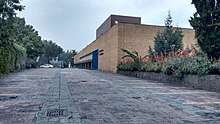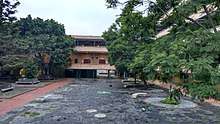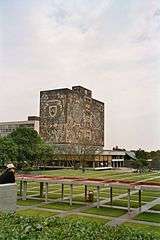School of Architecture, UNAM
The School of Architecture at UNAM is one of the leading schools of architecture and design in Mexico. It offers undergraduate and postgraduate studies in architecture, landscape architecture, urbanism and industrial design.


.jpg) Seal of UNAM's School of Architecture | |
| Type | Faculty |
|---|---|
| Established | 1783 |
| Dean | Marcos Mazari Hiriart |
| Location | , Mexico |
| Colors | Blue & Gold |
| Website | www |
History
The School is one of the follow-up institutions of the former Academia de San Carlos, the other one being the School of Arts and Design. The Academia de San Carlos offered studies in architecture since 1791, under control of the Royal and Pontifical University of Mexico. In 1910, Porfirio Diaz's government grants autonomy to the university, thus the academy was reorganized as the Escuela Nacional de Arquitectura (National School of Architecture) and the Escuela Nacional de Artes Plásticas (National School of Art). In 1954 the architecture school moved to its current facilities in Ciudad Universitaria as Facultad de Arquitectura. The first postgraduate studies in both architecture and urbanism were opened in 1968. In 1969 the school opened its undergraduate program in industrial design, and in 1985 the undergraduate programs in urbanism and landscape architecture and postgraduate studies in industrial design.
Staff and organization
The School is run by a dean, currently B.A. Marcos Mazari Hiriart. He is aided by a Technical Council, composed of professors and student and administrative representatives, which makes decisions regarding curriculum, school calendars and schedules, among other tasks.
The school includes the four undergraduate programs (architecture, landscape architecture, urbanism and industrial design), and the graduate, specialization and research programs (in architecture, urbanism and industrial design). In addition, the school holds its own architectural office, which develops projects both for the University and for external clients; and a cultural division that manages cultural events, exhibits, publications, lectures, etc.
The undergraduate program in architecture is organised within five branches: project; urban-environmental; technology; theory, history and research. Furthermore, the program is spread among 16 partially independent studios or workshops which offer all the mandatory courses. These studios are physically located in eight two story buildings (except for two located in the main building). These workshops originally were conceived to perform long-standing projects and focus on experimentation of different architectural conceptions, depending on the staff that the studio had, the profile of the students was formed.
The workshops are mostly named after Mexican architects or architects that had contributed to Mexican architecture:
- Luis Barragán
- Max Cetto
- Ehécatl 21
- Juan Antonio García Gayou
- Domingo García Ramos
- Jorge González Reyna
- Carlos Lazo Barreiro
- Carlos Leduc Montaño
- Jorge González Reyna
- Ramón Marcos Noriega
- Federico Mariscal y Piña
- Hannes Meyer
- Juan O'Gorman
- José Revueltas
- Tres
- José Villagrán García
Location and facilities
The School is located in Ciudad Universitaria in Mexico City, near the School of Engineering, UNAM. It is spread in two separate building complexes; the largest of which houses the undergraduate programs in architecture and landscape architecture, the architecture library, a cafeteria, the Carlos Lazo theater and the Museo Universitario de Ciencias y Artes (Science and Arts University Museum), as well as the main administrative offices. A separate building houses the graduate programs and the undergraduate programs in industrial design and urbanism, two libraries specializing in industrial design and in doctorate-level research, and a cafeteria.
Degrees offered
- Bachelor of Architecture
- Bachelor of Industrial Design
- Bachelor of Landscape Architecture
- Bachelor of Urbanism
- Master of Architecture
- Master of Industrial Design
- Master of Urbanism
- Doctor of Architecture
- Doctor of Urbanism
- Architectural specialization in Housing
- Architectural specialization in Lightweight Structures
- Architectural specialization in Real estate appraisal
Noted alumni
- Antonio Attolini Lack
- Alberto Arai
- Augusto H. Álvarez
- Honorato Carrasco
- Gabriela Carrillo
- Ignacio del Rio - on behalf of STUDIO MMX
- Carlos Obregón Santacilia
- Teodoro González de León
- Juan O'Gorman
- Carlos Lazo
- Carlos Leduc Montaño
- Ricardo Legorreta
- Mauricio De Maria y Campos<"Creación de Ciudad Universitaria". www.comitedeanalisis.unam.mx>
- Enrique del Moral
- José de Arimatea Moyao
- Mario Pani
- Emmanuel Ramirez -on behalf of STUDIO MMX
- Pedro Ramírez Vázquez
- Diego Ricalde - on behalf of STUDIO MMX
- José Revueltas
- Mauricio Rocha
- Mario Schjetnan
- Javier Senosiain
- Juan Sordo Madaleno
- José Villagrán García
